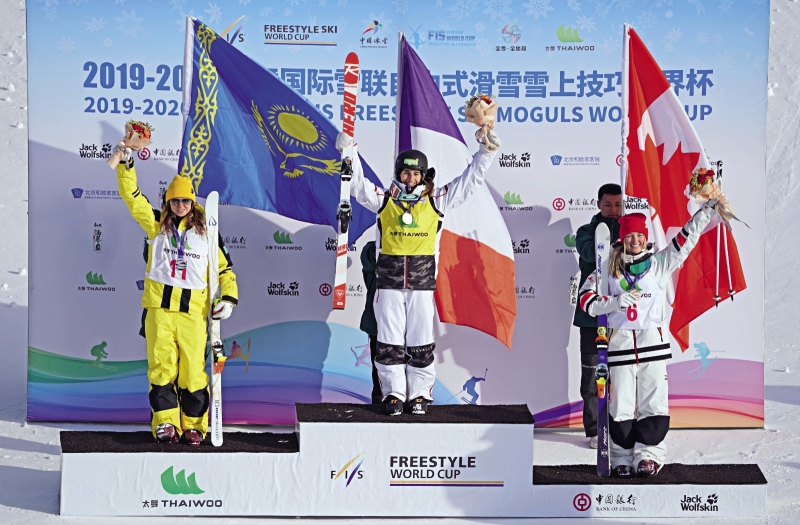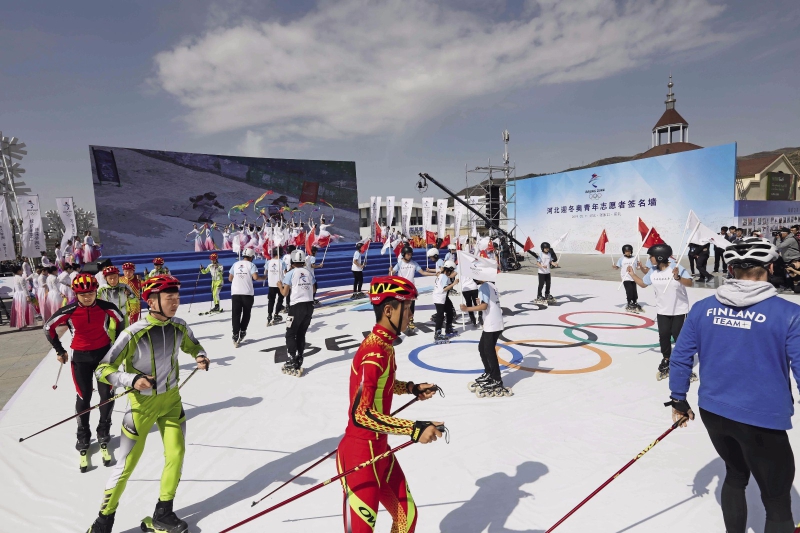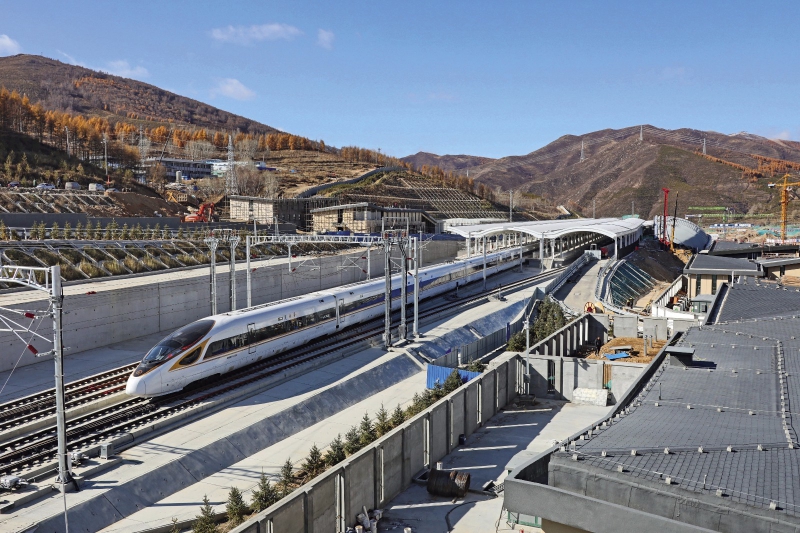
The moguls finals of the 2019-2020 Thaiwoo FIS Freestyle Ski Moguls World Cup are held in Chongli, north China’s Hebei Province, on December 14, 2019.
Over some 100 years ago, this was a pastoral area for nomadic ethnic minorities. Farming and trading were the main economic activities. Today, the small town, with a snow season as long as five months and permanent population of 126,000, is planning its industrial development from a new perspective. As a host town for skiing events of the 2022 Olympic Winter Games, Chongli, a district of Zhangjiakou City, Hebei Province, has set its sights on the snow business, tourism, and convention industry in line with international standards and aspires to emerge as an important link of the Beijing-Tianjin-Hebei economic circle.
White Bonanza
At 17:57 at the 128th International Olympic Committee (IOC) Session held on July 31, 2015 in Kuala Lumpur, Malaysia, IOC President Thomas Bach raised the sign “Beijing 2022.” This formally announced to the world that Beijing and its neighboring Zhangjiakou City in Hebei Province would be the host cities for the 2022 Olympic and Paralympic Winter Games. The news sent Chongli into raptures. Zhang Weiming, who ran a ski gear rental shop for close to six years, gulped down a glass of beer in the excitement. “A grand opportunity is approaching,” he recalled saying.
In fact, Chongli made a foray into the skiing business as early as 1996. Shan Zhaojian, the first national skiing champion after the People’s Republic of China was founded in 1949, and then director of the skiing department of the national sport commission, the predecessor of China’s General Administration of Sport, searched for an ideal place for skiing to promote the sport to the public.

The performance during the 1,000-day countdown celebrations of the Beijing 2022 Winter Olympic Games held in Chongli of Zhangjiakou City, north China’s Hebei Province on May 11, 2019.
Chongli attracted his attention. Only 200 kilometers away from Beijing, the place is easy to reach and has great market potential. It is in the geographical transition zone from the Inner Mongolia Plateau to the North China Plain, thus providing suitable mountain slopes for skiing. Snow comes early and heavy in the winter. It also features an average temperature of minus 12 degrees centigrade and moderate wind speed in the winter as well as a snow season lasting five months. These conditions all bode well for the snow industry. As a result, the first ski resort in the county, Saibei Snow Park, broke ground in 1996.
Thanks to the penetration of artificial snowmaking technology and increasing spending power of Chinese people, seven new resorts, including the Wanlong Paradise Resort, the Genting Resort, and the Fuli Resort were built in Chongli since 2003 to boost the local snow industry.
Before Beijing and Zhangjiakou won the winter Olympics bid, the supporting infrastructure in Chongli for ski resorts was dilapidated, according to Zhang. “These expressways used to be muddy, mountainous roads. And the accommodation conditions were also not good,” he said, adding that ski resorts were something far removed from the lives of ordinary local people. “They were places for wealthy people. There were also few people running rental shops like me. Most local people worked on farms or odd jobs.”
Despite poor infrastructure, the snow industry has the edge over other sectors in supporting the local economy. The county government realized this and pledged support to this industry as early as 2009. However, under-developed transportation restricted the county from developing its snow-related tourism.
Changes took place in 2010, when the Zhangjiakou to Chongli section of the Zhangjiakou-Chengde Highway opened to traffic. Tourists from neighboring regions could then get to Chongli more easily. In November 2013, Beijing announced that it would jointly bid for the 2022 Olympic Winter Games with Zhangjiakou, presenting an opportunity for this poor county to be included under state support. In 2014, the integration of the Beijing-Tianjin-Hebei region was made a national strategy. Against this backdrop, Chongli transformed its economy to a tourism-driven one thanks to its booming skiing industry. In the process, the county lifted itself out of poverty.
In the winter of 2015-2016, the first snow season after Beijing and Zhangjiakou won the bid for Olympic Winter Games, a total of 2.185 million trips were made to Chongli, generating revenue of RMB 1.54 billion, an increase of 30.8 percent and 31.6 percent year-on-year. In 2016, with the approval of the State Council, the administrative division in Zhangjiakou was adjusted, transforming Chongli from a county to a district under municipal administration. Chongli then welcomed a new era of high-quality development.
During the snow season from 2018 to 2019, the number of skiers visiting the seven ski resorts in Chongli district hit 1 million, up 25.9 percent year-on-year. Together with a great number of tourists coming for vacation, the total visitors to the district during the snow season amounted to 2.812 million.
In the past, the lengthy snow season restricted local farming and transportation. Today, it becomes a bonanza for the economic take-off of this 2,334-square-km district.
Winter Sports Magnet

A high-speed train running on the Beijing-Zhangjiakou high-speed railway in Zhangjiakou, north China’s Hebei Province on November 29, 2019.
China has pledged to promote snow and ice sports nationwide, as four state departments, including the General Administration of Sport, released a plan for its development from 2016 to 2025. The plan aimed to involve 300 million people in snow and ice sports by 2025.
On January 23, 2017, Chinese President Xi Jinping stressed the positioning of Chongli during an inspection tour to the district. “Chongli is about skiing. It will be a destination for professional skiers and skiing tourists. In building it, Chinese elements and local characteristics should be demonstrated,” he said.
In 2018, Zhangjiakou City laid out a local plan to develop the winter sports industry.
Improving the supporting infrastructure became the first focus of efforts. In less than five years, roads have been expanded, and a regional transport network is taking shape in Chongli district. Star-rated hotels and agritourist courtyards opened, improving accommodation facilities for tourists. The expressway and high-speed railway connecting Beijing, Chongli, and Zhangjiakou are under construction.
Businesspeople were quick to sense opportunities here. Among the top 10 national ski resorts rated during the 2018-2019 snow season, four were from Chongli district. Local government is stepping up efforts in building an industrial park for sports gear to attract high-end sports gear manufacturing projects. It is also building an incubator for related research and development. The aim is to foster a complete industrial chain, ranging from research and development to manufacturing, sports training, and education.
“We also host world-level commercial and professional games and work to improve our comprehensive service abilities,” said Zhao Qiong, a manager at the Genting ski venue, which will host freestyle skiing and snowboarding competitions in the 2022 Winter Olympics. “We need to improve our abilities to provide accommodation and medical services to athletes and others,” said Zhao.
The growing snow industry is also attracting various talents to Chongli. Zhao Qiang is a skiing coach from northeast China’s Heilongjiang Province. After the Genting ski venue was built, he quit his job in Beijing and came to Chongli. “There are more opportunities here compared with my hometown and life is less stressful here than in Beijing,” said Zhao Qiang. “There are more and more people skiing here and coaching is becoming sought after.”
More importantly, China’s skiing market has great potential. The 2019 International Report on Snow and Mountain Tourism released last April by the Geneva-based consultant and ski business expert Laurent Vanat, showed that the winter season of 2017-2018 saw an upbeat picture in the Chinese market. As the consumption power in China continues to rise, the sport itself and ski tourism will attract more high- and middle-income consumers, the report suggested.
Diverse Attractions
Skiing is not the only reason Chongli attracts tourists. In 2018, the district planted new trees covering an area of 27,980 hectares, expanding the local forest coverage rate to 67 percent. Chongli now boasts blossoms in spring, cool weather in summer, scenic sights in fall, and skiing in winter.
Taking advantage of local natural tourist resources and the booming skiing industry, local enterprises aim high by fostering a business model for the industry, which integrates social functions, an immersive tourist experience, and research and study functions. While attracting consumers, they are working on attracting them to stay and have re-visits.
From the viewpoint of Zhang Jianchen, director of the strategic development department with the Emerging Markets Institute of Beijing Normal University, the 2022 Beijing Olympic Winter Games gave a boost to the economy of Chongli from the national level. Driven by the skiing industry, Chongli has bright development prospects.
“It is a market of millions of high-income consumers in the Beijing-Tianjin-Hebei region,” said Guo Meihong, deputy executive for operation of the Forlong Group. She said after the high-speed railway and expressway is opened, it would take less than an hour and a half from Beijing or Tianjin to arrive here. Guo predicts that Chongli will be the closest skiing destination visitors will choose after the Olympics.
The convention industry is another attraction in the area. Like Davos in Switzerland, Chongli now boasts a pleasant environment and mature skiing industry, which are suitable for vacations. Convention tourists and visitors will improve the occupancy rate of hotels and boost the catering industry.
To attract more visitors, various businesses mushroomed in Chongli. There are more and more gyms, recreational centers, snow sport gear shops, convenience stores, and coffee shops. Various concerts and music festivals were also staged one after another. “To better use local resources, we also host winter camps and mountain marathons in the summer,” said Zhao Qiong.
Tian Yongjun, director of the local sports authority in Chongli, said the district would integrate snow sport into sightseeing, vacationing, and wellness services to extend the industrial chain. “In this way, Chongli will generate an enduring appeal to the whole family of sport enthusiasts,” said Tian.
Keeping aligned with international leading standards is a principle followed by businesses in Chongli. “Besides hotels, we also develop commercial complexes to satisfy consumers’ demands for catering, traveling, accommodation, shopping, and entertainment,” said Guo, adding there would also be hospitals and wellness centers. “Based on the full-range of public facilities, we will develop a complete service chain for consumers after the Olympic Games.”
ZUO LIN is a reporter with China Report.